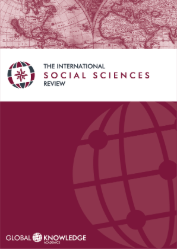Susanna Rowson’s Barbary Captivity Narrative, or the Struggle for the Freedom of American Women in Algiers
DOI:
https://doi.org/10.37467/gka-socialrev.v1.1545Abstract
This research explores the feminist dimensions of Rowson's play, Slaves in Algiers or, a struggle for freedom (1794), from historicist and dialogical perspectives. More particularly, it looks at the play within the context of the politics of the early American republic to uncover how Rowson deploys the captivity of American sailors in Algiers (1785-1796) as a pretext to deconstrust the established gender power relations without hurting the sensibilities of her audience in its reference to the issue of black slavery. The research also unveils the many intertextual relationships that the play holds with the prevalent captivity culture of the day, sentimental literature, and more specifically with Cervantes’s Don Quixote.
Downloads
Global Statistics ℹ️
|
320
Views
|
868
Downloads
|
|
1188
Total
|
|
References
Baepler, P.(1999). White slaves, African masters: an anthology of American Barbary captivity narratives. Chicago, IL: Chicago University Press.
Bakhtin, M. (1984). Problems of Dostoevsky’s poetics. (C. Emerson, Trans.). Bloomington: Indiana University Press.
Cervantes, M. S. (2000). The ingenious hidalgo Don Quixote de La Mancha. (J. Rutherford, Trans.). London: Penguin.
Norton, M. B., Katzman, D.M., Escott, P. D., Chudacoff, H. P., Paterson, T.G., Tuttle Jr. W. M.¬¬, Brophy, J. W. (1991). A people and a nation. Dallas, TX: Houghton Mifflin Company.
Peskin, L. (2009). Captives and countrymen: Barbary slavery and the American public 1785-1816. Baltimore, MA: John Hopkins University.
Richardson, S. (1980). Pamela; or, virtue rewarded. London: Penguin.
Rowson, S. (1794). Slaves in Algiers, or a struggle for freedom. Philadelphia, PA: Wrigley and Berriman.
Wollstonecraft, M. (2008). A vindication of the rights of woman and A Vindication of the rights of men. Oxford: Oxford University Press.
Downloads
Published
How to Cite
Issue
Section
License
Those authors who publish in this journal accept the following terms:
-
Authors retain copyright.
-
Authors transfer to the journal the right of first publication. The journal also owns the publishing rights.
-
All published contents are governed by an Attribution-NoDerivatives 4.0 International License.
Access the informative version and legal text of the license. By virtue of this, third parties are allowed to use what is published as long as they mention the authorship of the work and the first publication in this journal. If you transform the material, you may not distribute the modified work. -
Authors may make other independent and additional contractual arrangements for non-exclusive distribution of the version of the article published in this journal (e.g., inclusion in an institutional repository or publication in a book) as long as they clearly indicate that the work was first published in this journal.
- Authors are allowed and recommended to publish their work on the Internet (for example on institutional and personal websites), following the publication of, and referencing the journal, as this could lead to constructive exchanges and a more extensive and quick circulation of published works (see The Effect of Open Access).













